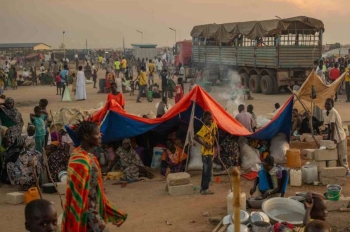
India’s Supreme Court on Oct. 17 quashed all criminal proceedings against Christians falsely accused of mass religious conversions, delivering a scathing rebuke to authorities for using the criminal justice system as a “tool of harassment of innocent persons.”
Justice J.B. Pardiwala and Justice Manoj Misra’s 158-page judgment vindicated Pastor Vijay Masih of the Evangelical Church of India in Fatehpur, dozens of staff members from the Broadwell Christian Hospital, officials of the Sam Higginbottom University of Agriculture, Technology and Sciences (SHUATS) in Prayagraj, and others named since April 2022 under Uttar Pradesh state’s anti-conversion law.
“The criminal law cannot be allowed to be made a tool of harassment of innocent persons, allowing prosecuting agencies to initiate prosecution at their whims and fancy, on the basis of completely incredulous material,” the court observed, quashing First Information Report (FIR) Nos. 224/2022, 47/2023, 54/2023, 55/2023 and 60/2023 along with all consequential proceedings.
The vindication comes after the acquittal in Uttarakhand state of the first Christian charged under its “anti-conversion” law, with Pastor Nandan Singh cleared after a four-year battle.
The ordeal for the Christians in Uttar Pradesh state began on Maundy Thursday, April 14, 2022, when Hindu extremists from the Vishwa Hindu Parishad (VHP) surrounded Pastor Masih’s church service, locked the gates and called police, alleging that 90 Hindus were being forcibly converted to Christianity. Pastor Masih was arrested along with 35 other Christians, and though initially released on bail after three days, he was re-arrested in October 2022 and remained in jail for over 100 days, Morning Star News reported in February 2023.
The Supreme Court found that the first FIR, filed by VHP Vice President Himanshu Dixit against 35 named and 20 unknown persons, was legally defective as it was lodged by a third party rather than an alleged victim. Under Section 4 of the Uttar Pradesh Prohibition of Unlawful Conversion of Religion Act as it stood before its 2024 amendment, only an aggrieved person or their relatives could file such complaints – a provision the court said was intended to prevent vexatious complaints by “busybodies.”
Nine months after the initial incident, four more FIRs were suddenly registered in January 2023 by persons claiming to be victims of the alleged mass conversion. FIR Nos. 54, 55 and 60 of 2023 each named 47 accused persons along with 20 unknown individuals, with many of the same Christians appearing in multiple complaints. The Supreme Court found serious credibility issues with these subsequent complaints and the investigation that followed.
The court noted that witness statements were “cyclostyled” or mechanically reproduced, with three affidavits submitted by alleged victims being identical except for the names of the deponents. The electronic stamp papers on these affidavits bore time stamps of 10:54 a.m., 10:55 a.m. and 10:52 a.m., indicating they were prepared in a mechanical manner.
In one glaring error highlighted by the court, both Sanjay Singh and Pramod Kumar Dixit stated in their affidavits that their Aadhaar card name was changed from “Rajesh Kumar Dwivedi” to “Rajesh Kumar Samson,” though neither person was actually named Rajesh Kumar Dwivedi.
“Nothing more is required to be said as regards the credibility of the affidavits submitted by the aforesaid three victim witnesses in light of the discrepancies that we have adverted to,” the court observed.
Most damning, the court found that complainants in the January 2023 FIRs had given completely contradictory statements during the initial investigation in April 2022. One complainant, Virendra Kumar, who filed FIR No. 54/2023 claiming he was a victim of forced conversion, had told police on April 15, 2022, that he was not a victim at all but rather a member of the VHP who had accompanied Himanshu Dixit to the church.
“The mere fact that the complainant in FIR No. 54/2023 had taken a complete U-turn from the statement he made during the course of investigation in FIR No. 224/2022, and more so that he, in his earlier statement, admitted having accompanied the informant in FIR No. 224/2022 makes it an easy guess as regards the circumstances in which multiple subsequent FIRs came to be registered,” the court stated.
While the judgment brought legal vindication, it came too late to undo more than three years of suffering for dozens of Christians whose lives were devastated by the false accusations.
Rev. Edwin J. Wesley, general secretary of the Evangelical Church of India, told Morning Star News that the Fatehpur incident was a “planned target against the Christian community.”
“The members of church have gone through a lot of pain, mental trauma, stress and depression. Many had to leave their jobs and move to other states,” Wesley said. “All this happened because the police were continuously after them to put them in jail and to keep them in jail for a long period. Many have undergone deep depression, where they need to consult the doctors for the recovery.”
Wesley said the church fully cooperated with four Special Investigation Teams formed by the government, repeatedly telling them that those who worship at their church are all Christians and members of the ECI Church and Mission Hospital who had not converted anyone.
“But police were not ready to believe,” he said. “Now, the Supreme Court judgment has quashed the four FIRs, which makes it very evident that they could not bring a single witness before the court which substantiated their claim that 90 Hindus have been converted.”
Pastor Jose Prakash George, who leads an independent church and lives inside the Mission Hospital compound, was arrested in February 2023 – 10 months after the initial incident – and spent five months in Fatehpur District jail before being released on bail in June 2023.
“They had no proof that there was any conversion going on here because there was nothing going on here,” Pastor George told Morning Star News. “It was all made up, and then they wanted to prove it. We prayed and will continue to pray that the Lord would bring the truth out and that has happened.”
Pastor George said a total of 68 people were named across the various FIRs, with many appearing in multiple complaints, affecting 68 families. Nine people were imprisoned with him, including four women, one teenager and four men. Among those named in the FIRs were five children ranging from 11 to 17 years old. A 17-year-old was jailed after authorities falsely recorded his age as 23 in official documents. One small girl was “shipped out late at night” to escape arrest, he said.
The financial and emotional toll on the families was catastrophic. Most of those accused were poor workers at the Mission Hospital earning only around 7,000 – 10,000 rupees (about US$79 to US$113) per month. All their savings went to fighting the cases as they had to travel to as many as eight different locations – some more than 40 kilometers apart – to record statements and present themselves for hearings in four different FIRs.
“I have seen parents cry like children because they were not able to provide even one glass of milk to their children and sometime not able to provide food,” Pastor George said. “Many children could not go to school for over two years. We could have perhaps endured the violence, but as a pastor I cannot tolerate the suffering of the children. Even today I pray with tears for the children no matter which church they belong to. The future of many children is spoiled.”
He said his own wife was threatened with jail and job loss, while his children faced constant harassment. In jail, he and other Christians were made fun of and looked down upon because they were implicated on conversion charges.
“The district court and the high court did not listen to us,” he said. “They would not even touch our file. We changed so many benches in the high court, but no relief came.”
J. Merin, senior administrative officer at Broadwell Christian Hospital, said that around 57 staff members were transferred or lost their jobs due to the FIRs. Staff whose names appeared in the complaints had to relocate to other hospitals within the Emmanuel Hospital Association’s network of 19 mission hospitals in North India for their safety.
“Most of them had gone through severe stress which had affected their health like anything,” Merin told Morning Star News. “And around 57 of them got transferred while many lost their job.”
She said one staff member told her after the Supreme Court verdict, “Now I can search for a good partner for my daughter.” When asked why now, he explained that marriage proposals wouldn’t come while there was an FIR against him.
The hospital’s community health programs were severely disrupted, with livelihood and health initiatives halted while only palliative care work continued. Local staff who refused to relocate lost their jobs when the hospital couldn’t renew their contracts due to the insecurity.
“We can say that we won the case and got the verdict in our favor,” Merin said. “But the damage is already done in these past three years.”
She recalled when crowds of Hindu extremists would block patients from coming to the hospital and would tell them that the hospital had closed.
“Our 50-bedded hospital, which was always packed, started getting only five to seven patients per day, which also resulted in a huge loss of revenue,” Merin said.
The Supreme Court’s judgment noted that chargesheets had already been filed in all the FIRs by the time the cases reached the apex court, but the court found the quality of materials gathered by investigating authorities “fail to inspire any confidence as regards the bona fide of the investigation.”
The court referenced its May 2024 oral observation that some parts of the Uttar Pradesh law on religious conversions seemed to violate Article 25 of the Constitution, which guarantees freedom of religion. A separate constitutional challenge to the 2021 Act remains pending before the Supreme Court.
Pastor Wesley said the Fatehpur case exemplifies the coordinated attacks on Christian minorities in India.
“Fatehpur is one fitting example where you can see that a planned attack was carried on minorities because of their faith in Christ,” he said. “We knew in the beginning itself that the police will not win these cases because we are very clear in our stand that we have not converted anyone and that we have freedom to worship in our religious place. We have freedom to preach practice and propagate the constitutional right given by this country.”
The hostile tone of the National Democratic Alliance government, led by the Hindu nationalist Bharatiya Janata Party, against non-Hindus has emboldened Hindu extremists in several parts of the country to attack Christians since Prime Minister Narendra Modi took power in May 2014, religious rights advocates say.
India ranked 11th on Christian support organization Open Doors’ 2025 World Watch List of the countries where it is most difficult to be a Christian, up from 31st in 2013 before Modi came to power.





